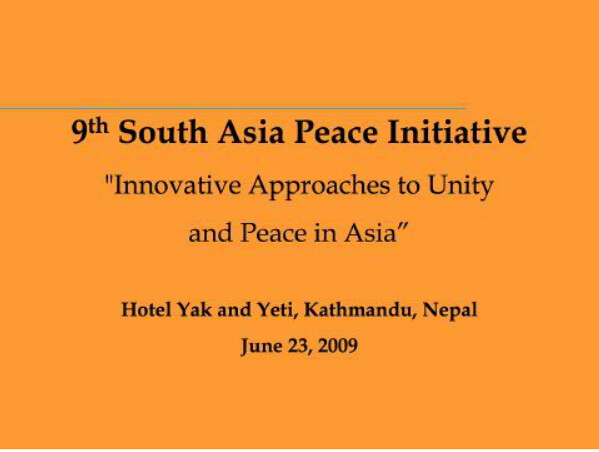Kathmandu, Nepal - “The first article in Nepal’s new constitution,” suggested Jose de Venecia rather forthrightly, “should be that we are all one human family under God.”
De Venecia, the former Speaker of the House of Representatives from the Philippines, was speaking at the ninth South Asia Peace Initiative conference held in the Nepalese capital June 23, attended by political leaders from 13 Asian nations. Nepal’s newly appointed Minister of Foreign Affairs, Sujata Koirala, presided.
Nepal is in the process of writing a new constitution and has just formed its second government under the leadership of Madhav K. Nepal since it overthrew a 240-year-old monarchy last year. He is the second prime minister in less than a year for this new federal democratic republic.
De Venecia is chairman of the International Conference on Asian Political Parties and was chief guest at the program. He said he came to this Himalayan nation to show support for the new government. This conference is a forum for 248 Asian political parties spanning the continent from Tokyo to Turkey and including the island nations of the Pacific. It was launched in the Philippines in 2000.
De Venecia explained that the vision of all humanity being one family under God has been gaining ground. To illustrate the impact that a real conviction that humankind is indeed a global family would imply, de Venecia asked pointed questions to the select group of political leaders: “Would you kill your own brother?” “Would you denigrate your own mother?” He went on to say that if we really live as if we are one family, the problems in our troubled world would be solved.
Chung Sik Yong, another South Korean native and regional chair of UPF-Asia, provided details about a recent UPF project in which a banner signed by all religious and political leaders of Nepal was taken to the summit of Mt. Everest. "This vividly demonstrated the power of a united vision during this time while Nepal is writing its founding legal document and forming its government," Yong said.
To get success, the climbers worked together as a team. They had one goal and were willing to sacrifice everything to achieve their objective. They went many nights without sleep and faced avalanches and ice falls. One climber, Gokal Thapa, was blinded by snow for 24 hours; later his oxygen mask clogged up at 8,500 meters, blocking the flow of oxygen. Fortunately, Thapa got a new mask from a member of another expedition; otherwise, he would have died.
Yong went on to explain that writing a new constitution was more difficult than climbing a mountain. “Politicians in Nepal,” he exhorted, “must have a similar spirit and determination. They must be willing to risk their lives and put the interest of the nation above everything—even their own party.”
Foreign Minister Koirala, on behalf of her government, thanked the Universal Peace Federation for holding the event and said her government would welcome and seriously consider fresh ideas as Nepal drafts a new constitution.
Earlier, the co-chairman of the International Conference on Asian Political Parties and a former member of the South Korean assembly, Chung Eui-yong met with Prime Minister Madhav Nepal. The prime minister outlined three objectives of this coalition government, which Chung shared with the conference participants: 1) How to sustain the peace process, 2) how to find the most effective form of government, and 3) how to fulfill the aspirations of the Nepali people.
Ambassador K.V. Rajan, President of the Indian Diplomatic Forum and former ambassador to Nepal, stressed that the principles of UPF apply equally to individual as well as nation-states. Nations and individuals that act selfishly can be very destructive. Therefore, they must overcome selfishness and live for others. Referring to de Venecia’s mention of One Family Under God, Rajan said that the essence of good governance at the international level is for nation-states to act as part of a global family with a common universal parent. Just as parents seek to teach their children that privileges come with responsibilities, political leaders must also understand that empowerment can only be sustainable if it is used responsibly.

